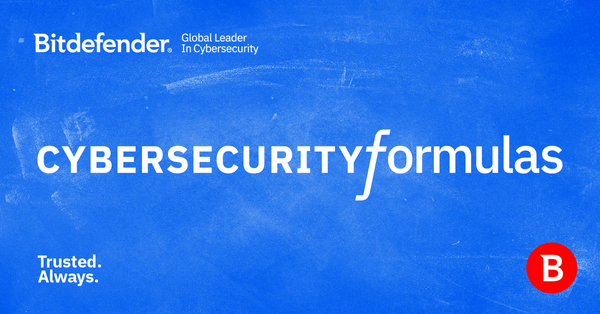Cybersecurity Awareness Month: Guide for Parents and Teachers to Nurture Safe Online Habits for Kids of All Ages (Presentation Included)

The internet provides a wealth of information and opportunities, but it’s also a melting pot of misinformation, cybercriminal activity and scams.
As a global leader in cybersecurity, we are dedicated to keeping everyone safe from the ever-evolving threat landscape. The online safety of children is an important focus area as we continue to celebrate Cybersecurity Awareness Month.
Together with our comprehensive solutions and educational initiatives, we aim to empower families and educators to protect children of all ages and foster safe digital interactions. As part of our mission, we’ve also developed a Comprehensive Cybersecurity Guide for Kids to help you equip children with the knowledge and tools they need to stay secure online.
This guide covers essential topics to help them navigate the online world safely. Below you can find a summary and some key tips to get parents and educators started:
- Understanding Digital Footprints and Online Reputation – Teaching kids the importance of managing their online presence and thinking carefully about what they share.
Key lessons: Always think before they post, use privacy settings to control who can view online content, and be mindful of their online reputation.
- Safeguarding Personal Information – Educating children on the risks of sharing personal data and how to protect themselves from identity theft and scams.
Key lessons: Never share personal information such as full name, home address, or school name with strangers online. Use strong, unique passwords, and avoid using the same password for multiple accounts.
- Social Media Safety – Outlining the risks associated with social media platforms and emphasizing the importance of privacy settings and responsible posting.
Key lessons: Using and maintaining the highest privacy settings available on social media platforms, not accepting friend requests, or interacting with strangers online.
- Cyberbullying – Providing strategies to recognize, prevent, and respond to cyberbullying in a healthy and effective way.
Key lessons: Never engage with bullies online, save evidence of bullying, inform a trusted adult, and use platform tools to block and report cyberbullying or improper behavior.
5. Recognizing Scams – Helping kids identify phishing attempts, fake giveaways, and other common online scams.
Key lessons: Be cautious of unsolicited messages asking for personal information and don’t click on links from strangers or suspicious sources, even if they promise exciting rewards.
- Online Gaming Safety – Learning about the risks associated with online gaming, such as interacting with strangers, making in-game purchases, and maintaining good online conduct.
Key lessons: Don’t share personal information with other players, the importance of using strong passwords, and setting privacy controls to limit friend requests from strangers.
7. The Importance of Being a Good Netizen - Beyond staying safe, one needs to understand why it is important to be a responsible and kind member of the digital community. Being a good netizen means respecting others, avoiding negative behaviors like trolling or spreading harmful content, and promoting positive interactions online.
Key lessons: The importance of treating others with respect and kindness online and helping their peers to report bullying behaviors and suspicious activity.
Cybersecurity Awareness Month provides an excellent opportunity for parents and teachers to equip kids with the skills they need to navigate the digital world safely and encourage them to reflect on how they can make the internet a more positive space. By understanding the importance of protecting their data, managing their online reputation, and recognizing threats, children can become responsible, informed, and resilient netizens.
By using resources like Bitdefender’s Comprehensive Cybersecurity Guide for Kids, parents and teachers can ensure children are well-prepared to protect themselves against online threats.
We also strongly advise you to:
- Encourage children to take part in a Digital Safety Quiz to reinforce cybersecurity lessons.
- Use tools like Bitdefender Scamio to help identify all kinds of online scams for FREE!
If you suspect someone is trying to scam you, or a website looks suspicious, check it with Scamio, our AI-powered scam detection service. Send any texts, messages, links, QR codes, or images to Scamio, which will analyze them to determine if they are part of a scam. Scamio is free and available on Facebook Messenger, WhatsApp, and your web browser. You can also help others stay safe by sharing Scamio with them in France, Germany, Spain, Italy, Romania, Australia, and the UK.
Download the presentation below:
tags
Author
Alina is a history buff passionate about cybersecurity and anything sci-fi, advocating Bitdefender technologies and solutions. She spends most of her time between her two feline friends and traveling.
View all postsRight now Top posts
How to Protect Your WhatsApp from Hackers and Scammers – 8 Key Settings and Best Practices
April 03, 2025
Outpacing Cyberthreats: Bitdefender Together with Scuderia Ferrari HP in 2025
March 12, 2025
Streamjacking Scams On YouTube Leverage CS2 Pro Player Championships to Defraud Gamers
February 20, 2025
How to Identify and Protect Yourself from Gaming Laptop Scams
February 11, 2025
FOLLOW US ON SOCIAL MEDIA
You might also like
Bookmarks






